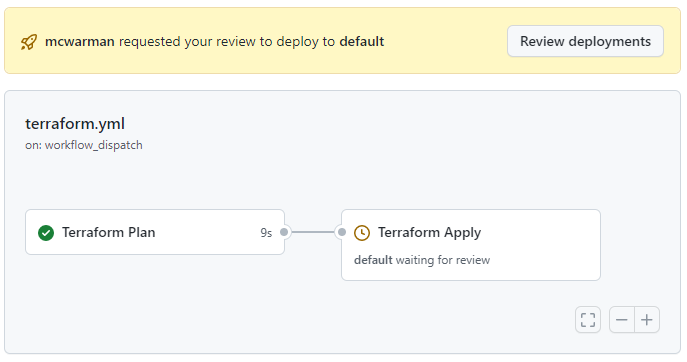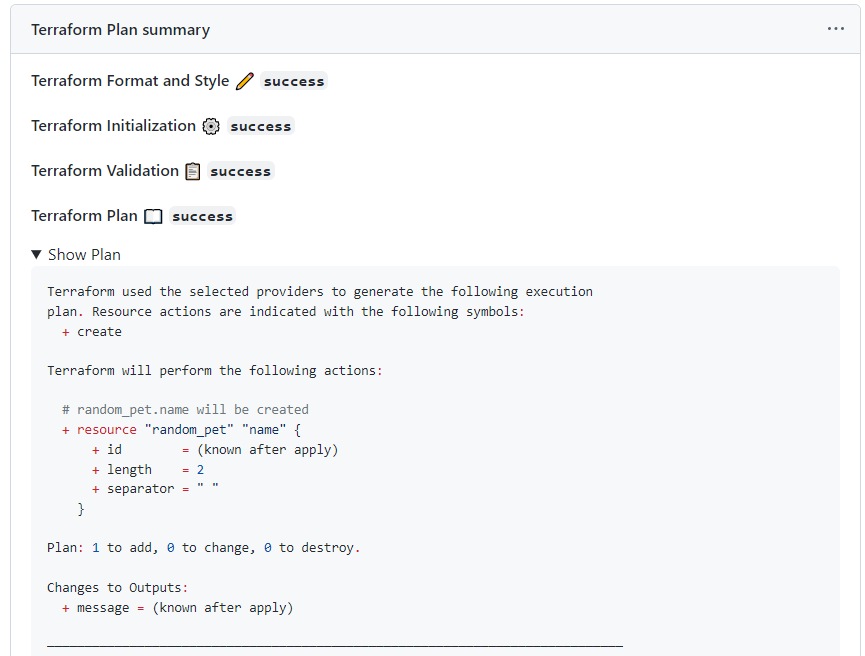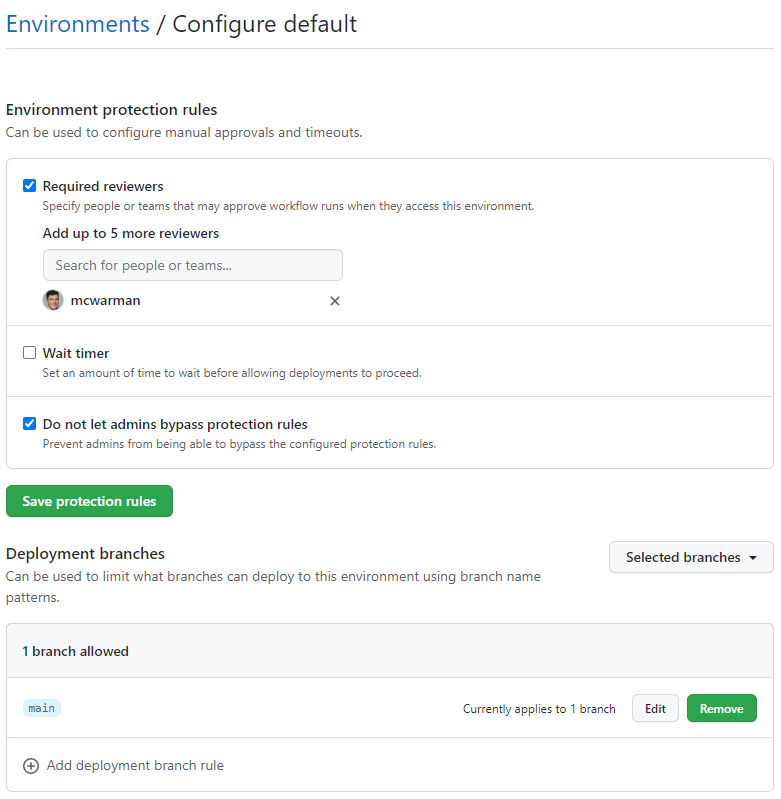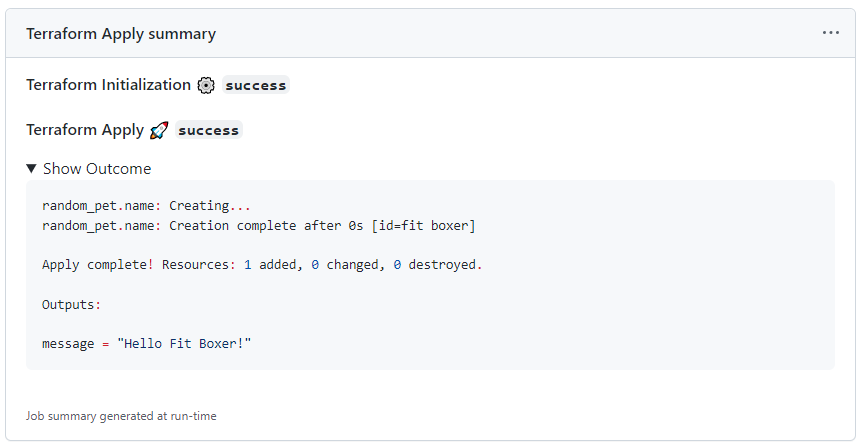on
Fixing Automating Terraform with GitHub Actions
I am involved in evaluating GitHub Actions as a part of migration activity, one of the technologies that is used in our CI/CD pipeline is Terraform.
Hashicorp provides a tutorial as a start for Automating Terraform with GitHub Actions.
Its a good start but in my opinion it is unusable for production environments as there is no Interactive Approval of Plans and instead it uses Auto-Approval of Plans something thats discouraged in the Terraform documentation for production environments.
The way it uses PRs as planning mechanism gives the perception of the Interactive Approval of Plans, but once the changes are merged everything is recalculated and the PR plan is discarded. For most scenarios this will probably be fine, but if there is an extended period of time between approval and merge the plan is redundant and Auto-Approval of Plans could have unintended effects on the infrastructure. Reusing the plan will only apply the changes approved.


The Interactive Approval of Plans is possible using a combination of GitHub Actions features:
- Multiple Jobs with needs to add dependencies between them.
- Environments and Protection Rules for interactive approval of plans.
- Step Summaries to remove the need to dig into Job Logs to see the plan and apply outcome.
- Artifacts for sharing the plan between jobs.
- Terraform Provider Plugin Cache to speed up jobs storing and reusing downloaded plugins.
Setting Up Repo
Environment and Protection Rules
In the repository Settings > Environment, create a new environment and configure.
On the configure screen add the required reviewers. This will allow for the plan to be checked and approved before applying.
Optionally set the allowed deployment branch. and disable admins bypass protection rules.

Review Actions workflow
The workflow is built up of two jobs with dependency on each other:
The workflow itself can run in three scenarios on a push to main, pull_request on main and workflow_dispatch. The latter allows you to run the workflow on demand.
name: "Terraform"
on:
push:
branches:
- main
pull_request:
branches:
- main
workflow_dispatch:
Common Setup
Both the Terraform Plan and Terraform Apply jobs run the same steps to begin with.
Checkout
Checks out code the code.
- name: Checkout
uses: actions/checkout@v3
Setup Terraform
Installs the terraform binary and the GitHub Action wrapper a script that exports the outputs.
- name: Setup Terraform
uses: hashicorp/setup-terraform@v2
Configure Terraform Provider Plugin Cache
Sets plugin_cache_dir setting in the .terraformrc and creates the directory to ensure its there. The setting of .terraformrc will mean during init plugins will be downloaded referenced from that directory.
- name: Configure Terraform Provider Plugin Cache
run: |
plugin_cache_dir="$HOME/.terraform.d/plugin-cache"
printf 'plugin_cache_dir="%s"' "${plugin_cache_dir}" > ~/.terraformrc
mkdir --parents "${plugin_cache_dir}"
Cache Terraform
Restores the cache if available, the cache is keyed on the lock file hash. But the restore-keys will mean other caches will be used even if the lock file has changed. Having this step will mean a Post step will be added to uploaded changes to the cache.
- name: Cache Terraform
uses: actions/cache@v3
with:
path: |
~/.terraform.d/plugin-cache
key: ${{ runner.os }}-terraform-${{ hashFiles('**/.terraform.lock.hcl') }}
restore-keys: |
${{ runner.os }}-terraform-
Terraform Plan
The Terraform Plan job is responsible for creating the plan, updating the summary, and updating the PR or uploading the plan.
The job itself requires permissions to update the pull requests.
jobs:
terraform-plan:
name: "Terraform Plan"
runs-on: ubuntu-latest
permissions:
pull-requests: write
Terraform Format
Checks the formatting of the terraform code recursively.
- name: Terraform Format
id: fmt
run: terraform fmt -no-color -check -diff -recursive
Terraform Init
Initialises the terraform workspace setting the lockfile to readonly so only expected versions of the plugins are allowed. Due to cache settings if this is not the first run of the repo plugins will be used from the cache.
- name: Terraform Init
id: init
run: terraform init -no-color -lockfile=readonly
Terraform Validate
Validate the configuration is correct without making any connection to remote services or provider APIs.
- name: Terraform Validate
id: validate
run: terraform validate -no-color
Terraform Plan
Plan the terraform changes against the current state, also output the plan to file tfplan
- name: Terraform Plan
id: plan
run: terraform plan -no-color -input=false -out=tfplan
Update Git Step Summary
Update the Step Summary by sending markdown to $GITHUB_STEP_SUMMARY using the outputs of the terraform tasks and stdout from the plan.
Also reuses the Step Summary as a step output with a key markdown using $GITHUB_OUTPUT.
The if success() || failure() is important, because if any of the earlier steps fail the summary is updated with which ones failed, and which ones were skipped.
- name: Update Git Step Summary
id: report
if: success() || failure()
env:
fmt_outcome: ${{ steps.fmt.outcome }}
init_outcome: ${{ steps.init.outcome }}
validate_outcome: ${{ steps.validate.outcome }}
plan_outcome: ${{ steps.plan.outcome }}
plan_stdout: ${{ steps.plan.outputs.stdout }}
run: |
{
printf "#### Terraform Format and Style :pencil2: \`%s\`\n\n" "${fmt_outcome}";
printf "#### Terraform Initialization :gear: \`%s\`\n\n" "${init_outcome}";
printf "#### Terraform Validation :clipboard: \`%s\`\n\n" "${validate_outcome}";
printf "#### Terraform Plan :book: \`%s\`\n\n" "${plan_outcome}";
printf "<details><summary>Show Plan</summary>\n\n";
printf "\`\`\`\terraformn%s\n\`\`\`\n\n" "${plan_stdout}";
printf "</details>\n\n";
} > "$GITHUB_STEP_SUMMARY"
eof=$(head -c15 /dev/urandom | base64)
{
printf "markdown<<%s\n" "${eof}";
cat "$GITHUB_STEP_SUMMARY";
printf "%s\n" "${eof}";
} >> "$GITHUB_OUTPUT"

Update Pull Request
Code adapted from the README.md of hashicorp/setup-terraform which will create or update existing comment using the output from the previous step.
The if again uses success() || failure() which is important, because if any of the earlier steps fail the summary is updated with which ones failed, and which ones were skipped. It also has the added condition to only run on a pull_request event.
- name: Update Pull Request
uses: actions/github-script@v6
if: (success() || failure()) && github.event_name == 'pull_request'
env:
markdown: ${{ steps.report.outputs.markdown }}
with:
github-token: ${{ secrets.GITHUB_TOKEN }}
script: |
// 1. Retrieve existing bot comments for the PR
const { data: comments } = await github.rest.issues.listComments({
owner: context.repo.owner,
repo: context.repo.repo,
issue_number: context.issue.number,
})
const botComment = comments.find(comment => {
return comment.user.type === 'Bot' && comment.body.includes('Terraform Format and Style')
})
// 2. Prepare format of the comment
const output = `${process.env.markdown}`;
// 3. If we have a comment, update it, otherwise create a new one
if (botComment) {
github.rest.issues.updateComment({
owner: context.repo.owner,
repo: context.repo.repo,
comment_id: botComment.id,
body: output
})
} else {
github.rest.issues.createComment({
issue_number: context.issue.number,
owner: context.repo.owner,
repo: context.repo.repo,
body: output
})
}
Encrypt & Upload Plan
The plan is the encrypted and uploaded as artefact, the plan contains sensitive information which is why encryption is important.
The encryption uses a passphrase that is secret set as an action repository secret.
The if ensures that the job is only executed on the default branch on either push or workflow_dispatch event.
- name: Encrypt plan
if: github.ref == format('refs/heads/{0}', github.event.repository.default_branch) && contains(fromJSON('["push", "workflow_dispatch"]'), github.event_name)
run: gpg --quiet --symmetric --cipher-algo AES256 --batch --yes --passphrase '${{ secrets.TF_PLAN_PASSPHRASE }}' --output tfplan.gpg tfplan
- name: Upload plan
if: github.ref == format('refs/heads/{0}', github.event.repository.default_branch) && contains(fromJSON('["push", "workflow_dispatch"]'), github.event_name)
uses: actions/upload-artifact@v3
with:
name: tfplan
path: tfplan.gpg
retention-days: 1
Terraform Apply
The Terraform Apply job is responsible for downloading the plan, applying it, and updating the summary.
The job has a few important settings:
- An
environment, the environment is setup in Settings with protection rules and Required reviewers to enable for interactive approval. - Has a dependency on the
terraform-planusingneeds - The
ifensures that the job is only executed on the default branch on eitherpushorworkflow_dispatchevent - The
concurrency: cancel-in-progress: trueensures that only the latest version of the action can run.
jobs:
//...
terraform-apply:
name: "Terraform Apply"
runs-on: ubuntu-latest
environment: default
needs: terraform-plan
if: github.ref == format('refs/heads/{0}', github.event.repository.default_branch) && contains(fromJSON('["push", "workflow_dispatch"]'), github.event_name)
concurrency:
group: ${{ github.ref }}
cancel-in-progress: true
Download & Decrypt Plan
The plan is downloaded and decrypted using the same passphrase from the action repository secret.
- name: Download Plan
uses: actions/download-artifact@v3
with:
name: tfplan
- name: Decrypt plan
run: gpg --quiet --batch --yes --decrypt --passphrase '${{ secrets.TF_PLAN_PASSPHRASE }}' --output tfplan tfplan.gpg
Terraform Init
Initialises the terraform workspace setting the lockfile to readonly so only expected versions of the plugins are allowed. Due to cache and this always running after the plan job, it is expected that plugins will all be used from the cache.
- name: Terraform Init
id: init
run: terraform init -no-color -lockfile=readonly
Terraform Apply
Apply the changes using the approved plan.
- name: Terraform Apply
id: apply
run: terraform apply -no-color -input=false tfplan
Update Git Step Summary
Update the Step Summary by sending markdown to $GITHUB_STEP_SUMMARY using the outputs of the terraform tasks and stdout from the apply.
Again the if success() || failure() is important, because if any of the earlier steps fail the summary is updated with which ones failed, and which ones were skipped.
- name: Update Git Step Summary
id: report
if: success() || failure()
env:
init_outcome: ${{ steps.init.outcome }}
apply_outcome: ${{ steps.apply.outcome }}
apply_stdout: ${{ steps.apply.outputs.stdout }}
run: |
{
printf "#### Terraform Initialization :gear: \`%s\`\n\n" "${init_outcome}";
printf "#### Terraform Apply :rocket: \`%s\`\n\n" "${apply_outcome}";
printf "<details><summary>Show Outcome</summary>\n\n";
printf "\`\`\`terraform\n%s\n\`\`\`\n\n" "${apply_stdout}";
printf "</details>\n\n";
} > "$GITHUB_STEP_SUMMARY"

Conclusion
For me this solves a lot of issues I had with action tutorial that hashicorp provided.
A working example can be found at mcwarman/terraform-workflow-test.